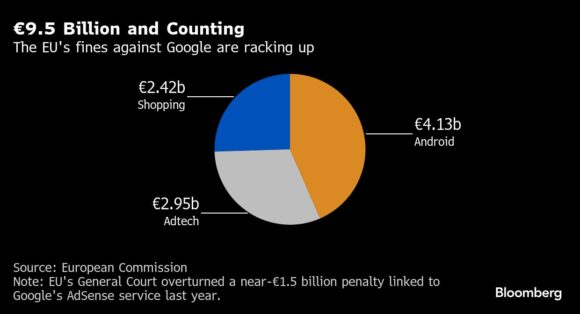The US will defend American companies from digital and environmental regulations taking effect in the European Union that may unfairly target them, according to the new US ambassador to the EU.
Concerns include the digital services and the digital markets acts, as well as ESG-related directives and the broader regulatory environment, said Andy Puzder, President Donald Trump’s appointee for the EU job. Just last week regional rules led to a $3.5 billion antitrust fine against advertising policies at Alphabet Inc.’s Google.
The Trump administration has complained about European initiatives that make business conditions harder for American companies, and Puzder is the president’s point man in the EU to fix that.
Puzder, who helped spur the anti-ESG movement in the US, wants a repeal of what he calls “draconian pieces of legislation,” as part of a focus on reducing Europe’s regulatory approach. At the same time, the former chief executive officer of the company that operated the Hardee’s and Carl’s Jr. fast-food chains said the US and Europe must work together to align their common interests to oppose China and Russia.
“There’s more discussion about what to do with the regulatory maze that’s been created over here over the past 30 years,” Puzder said in an interview from Brussels. The focus should be on simplifying “the regulatory barriers” that are impairing companies’ business in the region, he said.
Puzder made a name for himself in the US three years ago when he became a central figure in leading a network of like-minded Republicans in the war against environmental, social and governance investing.
What began as a scattershot, state-by-state effort to undermine ESG advocates turned into a coordinated effort that has had national impact, with investors pulling money from ESG-labeled funds for 11 straight quarters.
After Trump regained the White House in January, he nominated Puzder to be US ambassador to the EU and his appointment was confirmed last month by the Senate. He assumed the role on Thursday.
In a wide-ranging interview, the 75-year-old Puzder referred to calls from French and German leaders to rethink the ESG regulation called the Corporate Sustainability Due Diligence Directive. He emphasized that local opposition to the directive isn’t going away. CSDDD requires large EU and non-EU companies to identify, address and mitigate adverse environmental and human rights issues in their value chains.
Puzder also criticized the digital services and digital markets acts, as well as the Google fine. Trump has threatened to retaliate against the EU for the Google penalty, including the imposition of additional tariffs.

Europe’s ESG requirements also have triggered warnings from US Commerce Secretary Howard Lutnick who said in February that he’s willing to deploy “trade tools” to fight environmental requirements that might affect American companies.
Puzder spelled out his views about ESG and “woke” capitalism in a book published this year entitled A Tyranny for the Good of its Victims, The Ugly Truth about Stakeholder Capitalism.
“The economic impact of these ESG and DEI policies is beginning to hit home in the EU, just slower than in the US,” he said. “And things do move slower over here, but you’re beginning to see some recognition among some groups that changes need to be made.”
The main concerns about the digital services and digital markets acts are that they unfairly penalize US companies and also impede freedom of expression, he said.
“They appear to be aimed at US companies, and the fines are against these large US companies, and that isn’t acceptable,” he said. “You can’t be out there fining US companies that are providing these services in Europe as a way to make European companies more competitive with US companies.”
And separately, the digital regulations will suppress free speech, particularly related to political discussion, Puzder said.
“You can’t be out there saying, ‘we’re the defenders of democracy,’ and at the same time, you’re trying to limit free expression, free speech,” he said. “Free speech in Europe doesn’t have to be exactly what free speech is in the United States.”
Puzder’s viewpoint mirrors Trump’s, who has been vocal about the EU crackdowns on Elon Musk’s social media company X and Meta Platforms Inc. over allegations that those platforms are being used to interfere in national elections.
The dispute over specific regulations plays into a broader discussion over how the EU can lighten the regulatory environment and improve economic output as the region is under pressure to increase defense spending, and adjust to a future without cheap Russian energy and a waning retail market for EU goods in China, Puzder said.
The US needs to facilitate a shift to weaning off liquefied natural gas from Russia in favor of US sources for LNG, he said. Tariff agreements call for the EU to spend $750 billion on American energy products.
Another top priority will be to exert new pressure on Russia to end the war in Ukraine, Puzder said.
“I think people in Europe understand that Europe and the United States are both stronger when they stand together,” he said. “And while we may have disagreements on certain aspects of policy, we probably agree on a lot more than we disagree on.”
Photo: Andy Puzder. Photographer: Liam Kennedy/Bloomberg
Was this article valuable?
Here are more articles you may enjoy.



 Zurich Insurance Profit Beats Estimates as CEO Eyes Beazley
Zurich Insurance Profit Beats Estimates as CEO Eyes Beazley  Judge Tosses Buffalo Wild Wings Lawsuit That Has ‘No Meat on Its Bones’
Judge Tosses Buffalo Wild Wings Lawsuit That Has ‘No Meat on Its Bones’  Insurance Broker Stocks Sink as AI App Sparks Disruption Fears
Insurance Broker Stocks Sink as AI App Sparks Disruption Fears  AIG’s Zaffino: Outcomes From AI Use Went From ‘Aspirational’ to ‘Beyond Expectations’
AIG’s Zaffino: Outcomes From AI Use Went From ‘Aspirational’ to ‘Beyond Expectations’ 

